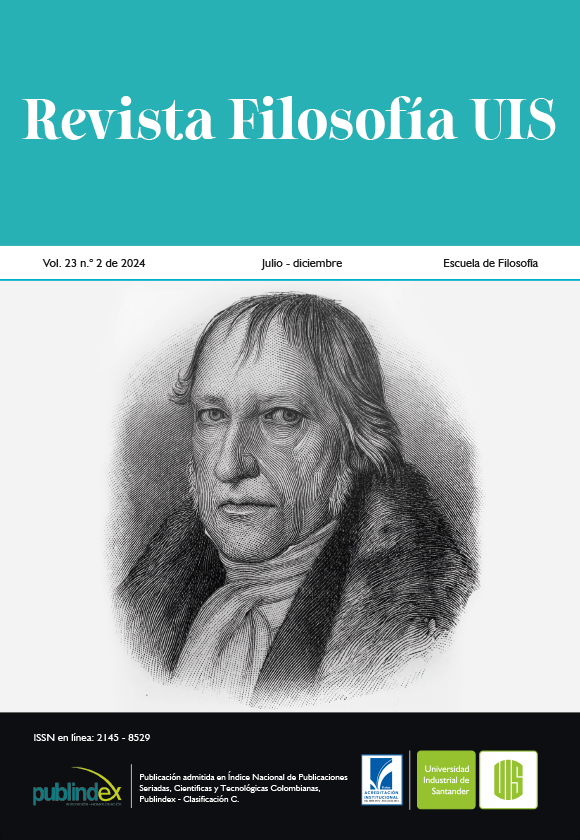Between Writing and Praxis: Nietzschean Perspective on Philosophical Interpretation and Consulting
Published 2024-07-31
Keywords
- Nietzsche,
- will to power,
- interpretation,
- writing,
- philosophical counseling
- philosophical practice ...More
How to Cite
Copyright (c) 2024 Revista Filosofía UIS

This work is licensed under a Creative Commons Attribution 4.0 International License.
Abstract
This article examines the role of writing in philosophical counseling from a Nietzschean perspective, suggesting that it facilitates the expression and reconfiguration of the consultant's interpretations of his or her life. It is based on the premise of the "will to power" as an explanatory principle of reality, which drives individuals to seek understanding and transformation. Thus, philosophical activity is conceived as a constant interpretation, where writing emerges as a crucial tool for the manifestation of these pre-existing interpretations, which are subsequently reinterpreted. Philosophical counseling, in turn, establishes itself as a conducive space for this interpretative act, using writing as a medium. This process allows consultants to examine and reconfigure their perceptions and interpretations, leading to new understandings of themselves. In summary, the article argues that writing in philosophical counseling is not only a means of expression but also a philosophical activity that enables self-awareness and self-knowledge through the constant reinterpretation of one's own life.
Downloads
References
- Ávila, R. (1999). Identidad y tragedia. Editorial Crítica.
- Blanchot, M. (1977). Nietzsche y la escritura fragmentaria. En M. Blanchot, & R. Pérez (Ed.), Nietzsche, 125 años (pp. 259-299). Editorial Temis.
- Buatu, O. (2022). Hermenéutica de la cosmovisión. Una estrategia de cambio en la consultoría filosófica. Aitias. Revista de estudios filosóficos, 2(3), 185- 214. https://doi.org/10.29105/aitias2.3-30
- Conill Sancho, J. (2007). El poder de la mentira. Editorial Tecnos.
- Gama Barbosa, L. E. (2004). Muchas interpretaciones o un único horizonte. El problema de la interpretación en Nietzsche y Gadamer. En L. E. Gama, et al., & C. B. Gutierrez (Ed.), No hay hechos, sólo interpretaciones (pp. 3-65). Ediciones Uniandes.
- Gama Barbosa, L. E. (2014). Nietzsche y la vida interpretante. Praxis Filosófica (39), 171-196. https://doi.org/10.25100/pfilosofica.v0i39.3520
- Hadot, P. (2006). Ejercicios espirituales y filosofía antigua. Siruela.
- Heidegger, M. (2000). Nietzsche (Vol. I). (J. L. Vermal, trad.). Ediciones Destino.
- Jara, J. (1998). Nietzsche, un pensador póstumo. Anthopos Editorial.
- Meléndez, G. (2001). Hombre y estilo, (su) grandeza y unidad en Nietzsche. En M. Brusotti, et al., & G. Meléndez (Eds.), Nietzsche en perspectiva (pp. 215-234). Siglo del Hombre Editores
- Müller-Lauter, W. (1999). Nietzsche. His Philosophy of Contradictions and the Contradictions of his Philosophy. (D. J. Parent, trad.). University of Illinois Press.
- Nehamas, A. (2002). Nietzsche, La vida como literatura. (R. J. García, trad.). Turner Publicaciones.
- Nietzsche, F. (2008). Fragmentos Póstumos. [FP]. (Vol. IV). (D. Sánchez Meca, Ed., J. L. Vermal, & J. B. Llinares, trads.). Editorial Tecnos.
- Nietzsche, F. (2010). Fragmentos Póstumos. [FP]. (Vol. III). (D. Sánchez Meca, Ed., D. Sánchez Meca, & J. Conill, trads.). Editorial Tecnos.
- Nietzsche, F. (2011). Así habló Zaratustra. [Z]. (A. Sánhez Pascual, trad.). Alianza Editorial.
- Nietzsche, F. (2011). Ecce Homo. [EH]. (A. Sánhez Pascual, trad.). Alianza Editorial.
- Nietzsche, F. (2012). Más allá del bien y del mal. [MBM]. (A. Sánchez Pascual, trad.). Alianza Editorial.
- Prada Dussán, M., Acevedo Zapata, D.M. & Prieto Galindo, F.H. (2019). Filosofía como forma de vida. Laboratorio de escritura: Estrategia pedagógica. Editorial Aula.
- Rilke, R. M. (2006). Cartas a un joven poeta. Norma-Colección Milenio.
- Rivero Weber, P. (2004). Nietzsche como el precursor de la hermenéutica moderna. En L. E. Gama, et al., & C. B. Gutiérrez (Ed.), No hay hechos, sólo interpretaciones (pp. 151-168). Ediciones Uniandes.
- Safranski, R. (2002). Nietzsche. Biografía de su pensamiento. (R. Gabás, trad.). Tusquets Editores.
- Spinoza, B. (1998). Ética. (V. Peña, trad.). Alianza Editorial.
- Sumiacher, D. (2016). Prácticas filosóficas críticas y creativas. Journal of Humanities Therapy, 7(1), 39-70.
- Valencia Magallón, Ó. (2019). Distinciones básicas y especificidad de la consultoría filosófica en relación a las psicoterapias. Haser, 10, 65-91. https://doi.org/10.12795/HASER/2019.i10.03

